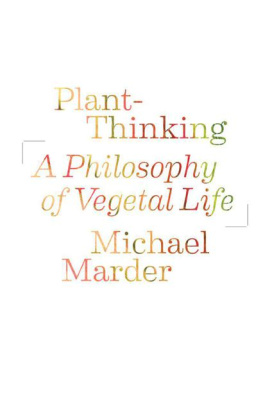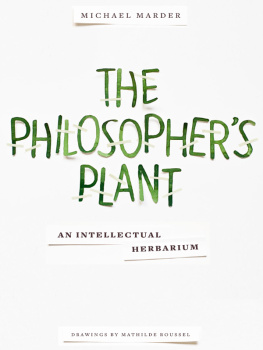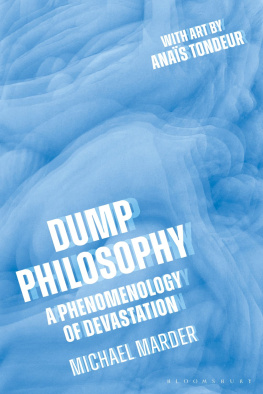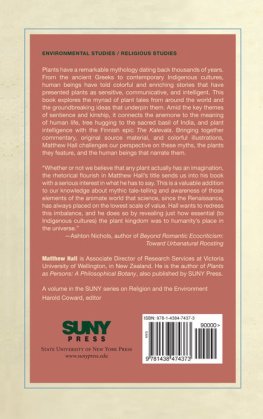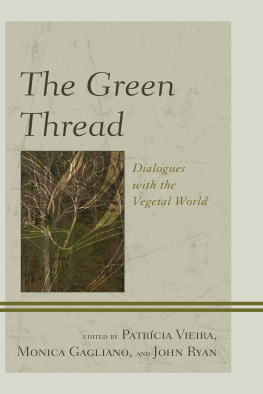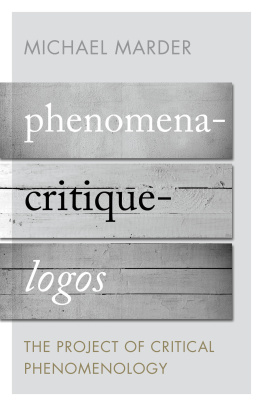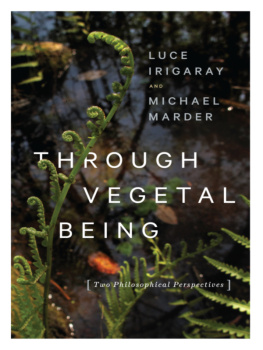PLANT-THINKING
Plant-Thinking
A Philosophy of Vegetal Life
MICHAEL MARDER
WITH A FOREWORD BY Gianni Vattimo and Santiago Zabala
Columbia University Press
New York

Columbia University Press
Publishers Since 1893
New York Chichester, West Sussex
cup.columbia.edu
2013 Columbia University Press
All rights reserved
ISBN 978-0-231-53325-6 (e-book)
Library of Congress Cataloging-in-Publication Data
Marder, Michael, 1980Plant-thinking: a philosophy of vegetal life / Michael Marder.
p. cm.
Includes bibliographical references and index.
ISBN 978-0-231-16124-4 (cloth: alk. paper)
ISBN 978-0-231-16125-1 (pbk.: alk. paper)
1. PlantsPhilosophy. 2. Ontology. 3. Human-plant relationships. I. Title.
QK46.M37 2013
580dc23
2012023675
A Columbia University Press E-book.
CUP would be pleased to hear about your reading experience with this e-book at cup-ebook@columbia.edu
References to Internet Web sites (URLs) were accurate at the time of writing. Neither the author nor Columbia University Press is responsible for URLs that may have expired or changed since the manuscript was prepared.
memria da minha av, Maria Incia

Plotinus, Enneads 3.2.7
Contents
Gianni Vattimo and Santiago Zabala
GIANNI VATTIMO AND SANTIAGO ZABALA
On August 29, 2009, the democratically elected president of Bolivia, Evo Morales, was declared the World Hero of Mother Earth by the General Assembly of the United Nations in recognition of his political initiatives against the destruction of the environment caused by the global hegemonic economic system. According to the president of the Assembly, Rev. Miguel DEscoto Brockmann, the Bolivian politician has become the maximum exponent and paradigm of love for Mother Earth.an indication of their indifference toward the environmental calamities (and financial crises) their own logic of profit produces, not to mention that this delegitimization shows, most of all, how thoroughly these democracies are framed within metaphysics. If, as it seems, there is a correspondence between the liberal capitalist states and metaphysical philosophical impositions that consider the environment as something that must be manipulated for our own purposes, philosophy has the obligation to break this deplorable alliance.
Although Michael Marder does not mention these politicians in his study, the political essence of their ecological initiatives is not foreign to his philosophical endeavor, a project entrenched in weak thought, that is to say, in the philosophy of the weak who are determined to cut the tie between politics and metaphysics. But what exactly is weak thought?
Weak thought, contrary to other philosophical positions, such as phenomenology or critical theory, has not developed into an organized system, because of all the violent consequences such systematization always entails. The violence of systems is often expressed through metaphysical impositions, which aim to submit everything to their own measures, standards, and agendas. But as the philosophy of the weak (which claims the right of the oppressed to interpret, vote, and live), weak thought not only follows a logic of resistance, but also promotes a progressive weakening of the strong structures of metaphysics. Weakening, like deconstruction, does not search for correct solutions wherein thought may finally come to rest, but rather seeks ontological emancipation from truth and other concepts that frame and restrict the possibilities of new philosophical, scientific, or religious revolutions. These revolutions, as Thomas Kuhn explained, are the indications that science shifts through different phases andinstead of making progress Given these scientific revolutions, or, as Heidegger termed them before Kuhn, destructions of metaphysics, thinking is no longer demonstrative, but edifying, conversational, and interpretative. What does such emancipation from metaphysics entail and why is there a predilection for weakness in weak thought?
Contrary to some critics of weak thought,; it is the weakness of Being that allows us to overcome metaphysics, not the other way around.
What binds together weak thought and plant-thinking is the political motivation of hermeneutics. Although its the weakness of Being that allows Marder to expose a philosophy of vegetal life free from our categories, measures, and frames, such freedom would be useless if it were to imply a non-hermeneutical concept of nature. After all, nature has always been framed as a normative concept both when it came to vegetal life and when it was bearing upon existence itself, determining how we should act and be regardless of our differences. This is why, from the first pages of this book, Marder presents his study as a call to give prominence to vegetal beings, taking care to avoid their objective description and, thereby, to preserve their alterity.... The challenge is to let the plants be and appear within the framework of what, from our standpoint, entails profound obscurity, which, throughout the history of Western philosophy, has been the marker of their life (introduction). This is also why, in contrast to the previous metaphysical-philosophical accounts of vegetal life (exposed in the first part of the book), where the essence of plants is determined only by applied and imposed categories, Marder suggests (in the second part of his study) that we conceive of this essence as radically different from everything measured in human terms because [the plants] not only are but also exist (is their existence that allows us to imagine our relation to plants not in terms of our world (following Heideggers sense of the term) facing a non-world, but in terms of an interaction of two worlds (ours and what Marder calls the plant-world).
Building upon the existential consequences of Heideggers destruction of metaphysics, his ontology is not of the plant but for the plant, and in this way it is opposed to previous metaphysical positions. More significantly, Marders ontology of vegetal life distinguishes the Being of plants from the beings themselves, that is, from the ontic categories the metaphysical tradition has always imposed on them. This is what Heidegger called the ontological difference between Being and beings, in which Marder envisages the deconstruction of the metaphysical split between the soul and the body, eliminating, in the same gesture, the classical opposition between theory and practice ().
In responding to the end of metaphysics by weakening the ontic categories of vegetal life, Marder, far from demonstrating that they were wrong, is implying that they were constrained politically, for instance, in being exclusively regulated by the capitalist agro-scientific complex (). Marder nicknames this political space vegetal democracy, which is not very different from the ecological political initiatives the so-called marginal governments of South America are activating. Just as these environmental political initiatives are constantly discredited and undermined by capitalist-run democracies, so metaphysics opposes such uncomfortable philosophical positions as weak thought, of which this book is an outstanding example.
Notes
. Examples of such delegitimization have been coming from prominent newspapers and journals such as the New York Times, El Pas , the Washington Post , and Foreign Policy . A detailed account of this distorted information can be found in the fourth chapter of our Hermeneutic Communism (New York: Columbia University Press, 2011).
. Weak thought pensiero debole was first formulated in 1979 and has since become a position common to many post-metaphysical philosophers, including, among others, Richard Rorty. A full account of this concept can be found in the volumes Weakening Philosophy , ed. S. Zabala (Montreal: McGill-Queens University Press, 2007), and Between Nihilism and Politics: The Hermeneutics of Gianni Vattimo , ed. S. Benso and B. Schroeder (Albany: SUNY Press, 2010).
Next page
